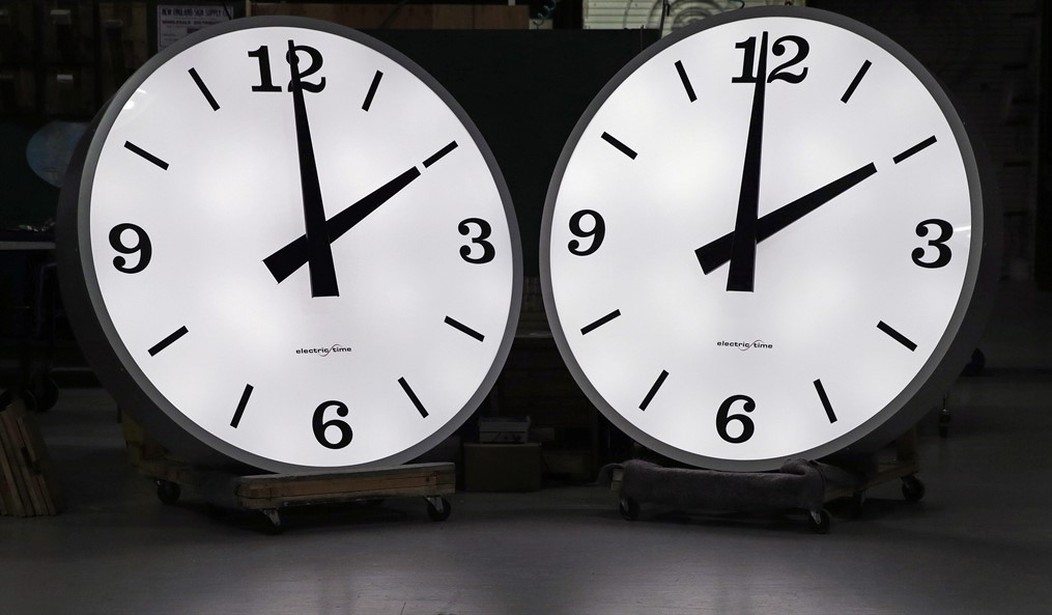This coming weekend brings the annual ritual of Americans setting their clocks back one hour as part of Daylight Saving Time. For at least the past seven years I have had one battery-powered clock on the wall in our kitchen that I have stubbornly refused to change, so for part of each year, it shows a different time than the rest of the clocks. With that in mind, I was probably part of the target audience for an article published today at Issues & Insights titled ‘Stop the government-mandated clock-changing madness; It’s pointless and dangerous.’ The editorial board persuasively argues that there was never much point to the system and there is even less in the modern era. On top of that, some research suggests that the practice causes actual harm to some people.
This weekend, hundreds of millions of Americans will dutifully set their clocks back one hour, convincing themselves that they’ve “gained” an hour – despite spending at least part of it resetting all their timepieces.
Americans should instead refuse to play along. Few government mandates combine such utter pointlessness and serious public health harms than the twice-a-year switch on and off Daylight Saving Time. It’s time to end the madness.
First, despite its label, “Daylight Saving Time” does not save daylight. It doesn’t even save energy. Two studies looked at energy use before and after changes in DST laws.
Two studies in Indiana in the early days of DST found no energy savings from before and after it began. Another study found that suicide rates and reports of substance abuse issues both rose measurably for a period right after the change. An increase in traffic fatalities was noted on the Monday after a clock change, presumably because sleep-deprived people are more error-prone while driving. Higher rates of heart attacks and workplace accidents were also reported.
So if all of this is true, what’s the solution if the government refuses to pass a bill putting an end to DST? (There is such a bill, but it’s currently stalled.) According to I&I, you should just be a rebel. Stand up proudly, refuse to change your clocks, and go about your day just as you do now. But could most people actually get away with becoming a Rebel Without a Pause?
I’m dubious about that for several reasons, not least of which is the fact that our current technology would put up quite a fight. I mentioned that clock in my kitchen because it is battery-powered and not “hooked up” to anything. My clock remains blissfully unaware of the internet, Artificial Intelligence, and everything else that comes with it. It is magnificent in its simplicity. But nearly every other clock I deal with changes by itself. My cellphone changes automatically, as does our cable TV channel box. The alarm clock in our bedroom somehow knows to change without being asked. There may be a way to get around that which I’m not savvy enough to figure out, but the digital game appears to be rigged.
Then there are the social and professional questions. If your employer observes DST, they may be impressed by your work ethic when you suddenly start showing up an hour early every day in the fall. But that admiration may turn into a pink slip if you’re an hour late each day in the spring. Again, perhaps they would work with you and change your hours, but that could cause issues for the whole team.
If you’re in a dating relationship and you make this choice, you’d better ensure that your partner is rebellious in the same fashion or very understanding. Otherwise, somebody is going to wind up sitting alone in the restaurant for an hour. And particularly for the guys out there (and a fair percentage of the lesbians, I’m assuming), ladies don’t appreciate being kept waiting in that fashion and you may wind up dining alone at an unfashionable hour.
So, yes. I’m annoyed by the clock-changing madness and I fully support ending it. But going it alone may prove harder than you imagine. It would be better to get on the back of the new House Speaker and push him to introduce and pass the bill. It already passed the Senate by unanimous consent, but Nancy Pelosi refused to introduce it. Perhaps this is the moment when it could happen.








